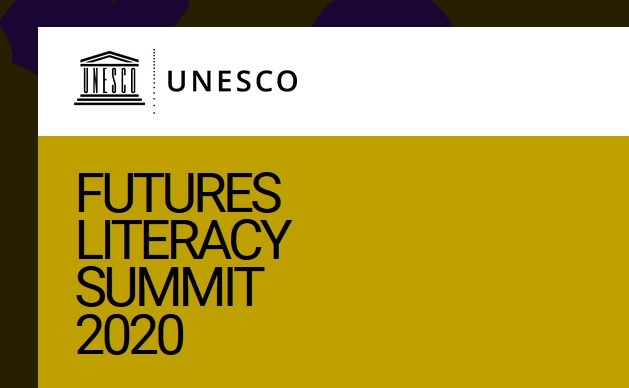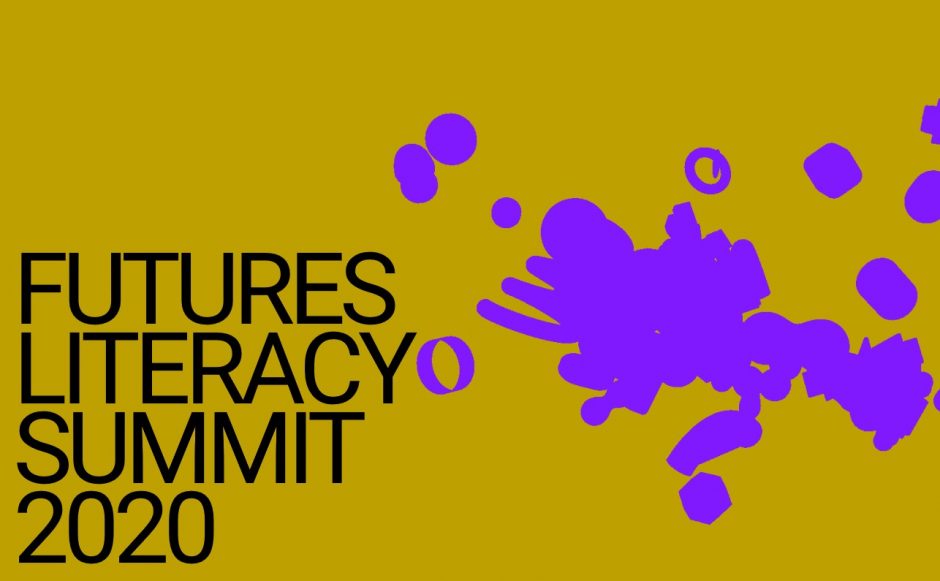Visit our virtual booth and join our live events!
From 8 to 12 December 2020, the UNESCO High-Level Futures Literacy Summit will provide testimonials from around the world that being futures literate changes what people see and do.
You can now register for the Summit here: https://unes.co/futures-literacy-summit-register
OUR LIVE WORKSHOPS AT THE SUMMIT
During the Summit, you can visit EIT-Climate-KIC’s virtual booth and discover our Futures Literacy activities as well as engage with futures literacy experts from our community. We will also offer online sessions cover various topics:
-
10 Dec, 11am to 12pm CET: Amplification of Imagination in Practice
Hosts: Krzysztof Bilinski (EIT Climate-KIC), Andrzej Górz (Municipality of Leśna, Poland) Diana Raiselis (Alexander von Humboldt Foundation/VibeLab), Diane Drubay (We Are Museums), Maria Christantoni (Hellenic Republic Asset Development Fund), Zuzanna Popis (EGO – Evaluation for Government Organizations)
How does questioning paradigms, creating new visions and shaping a new future works in different sectors? What factors trigger the need to re-imagine industries, sectors or locations? What are the symptoms of changes we can observe? How to involve various stakeholders in transformative projects? These questions will be discussed by EIT Climate-KIC with representatives of different sectors who have taken on the challenges of creating new visions for arts and culture, nightlife, port industry, public policies and urban movements.
-
10 Dec, 3pm to 4pm CET: Investing in our future – Is time the most potent prism for climate action?
Hosts: Josephine von Mitschke-Collande (EIT Climate-KIC), Nick Balcom Raleigh (Turku University), Anne Schoenauer (2 Degree Investing), Tim Giger (Centre for Systems Solutions)
Current economic paradigms of growth and industrialisation need to move towards circular and natural capital. Central to shifts towards long-term thinking is understanding how society values time. Sustainability requires long-term orientation. How can we rethink notions of value towards long-term and shift towards long-term thinking to create ecosystems that collaboratively can change our economy from an extractive to a regenerative one? Please join EIT Climate-KIC and partners to learn more about their work within Deep Demonstration Long-termism aiming to rethink our economic systems through systems innovation.
Join the live event: INVESTING IN OUR FUTURE
-
11 Dec, 9am to 12pm CET: Resilient City Futures
Hosts: Loes Damhof (Hanze University), Elles Kazemier (Hanze University)
Let’s talk outside the box! This workshop will take you to the long-term future and back in order to explore what it takes to create pathways to resilient cities and how to diversify in the here-and-now. In order to adapt to climate change and to prevent heat stress and flooding, cities all over the world put great effort in becoming more resilient. But while working on cooler, dryer, greener or healthier cities, other pressing issues may very well arise. In this future probing workshop, we will examine our thoughts on city challenges in the upcoming 75 years. How do we expect everyday life to be? Did we, as a local community, succeed in adaptation? What ‘new’ tragedies do we foresee that need our attention? By collectively travelling to the year 2095 and back you will ultimately explore what it means to strive for city resilience, and what our call for agency is today.
Join the live event: Resilient City Futures
-
11 Dec, 3pm to 4pm CET: Using emergence for organisational shift: A new model
Hosts: Martin Calnan (École des Ponts Business School), Amos Taylor (Finland Futures Research Centre, University of Turku), Christine Kavazanjian (UNESCO), George Profitiliotis (FORTH/PRAXI Network), Noora Vähäkari (Finland Futures Research Centre, University of Turku)
In a world where the vulnerabilities of our system have become acutely apparent, traditional planning and forecasting mechanisms struggle to adapt to the new normal of unbounded uncertainty. Over the past year, EIT Climate-KIC and the FLxDeep team have been exploring ways to create cultures and organizations of transition with corporate and institutional partners. Join us for an interactive feedback session on our new model.
Join the live event: Using emergence for organisational shift: A new model
EIT CLIMATE-KIC VIRTUAL BOOTH IN THE SUMMIT AGORA
The Agora represents the virtual exhibition space for governments and institutions championing Futures Studies and Futures Literacy globally. At the Agora visitors will be able to interact with over 50 booths in a specially designed virtual exhibition space.
Additional live workshops will be available in the Agora from 10–12 December. These events will accommodate all time zones and can be registered for in advance through the Summit platform.
Register to the summit (no fees) and visit EIT Climate-KIC’s virtual booth to get in touch with Futures Literacy practitioners in our live meeting, get access to interesting material around Futures Literacy and join our live workshops.

ABOUT THE UNESCO FUTURES LITERACY SUMMIT 2020
From high ranking leaders in the public and private sector to activists, artists, students and professors, the Summit will show how people become futures literate and the impact it has on all aspects of life, from dealing with COVID-19 to breaking the reproduction of oppression.
Now, as always, the future is uncertain. Climate change, pandemics, economic crisis, social exclusion, racism, oppression of women, inter-generational conflict, and more, shatter the conventional images of the future that humans use to feel secure, to be confident enough to invest in tomorrow.
This is not a small problem. Without images of the future that inspire hope and foster collaboration, there is a high risk of despair and war. The malaise of poverty-of-the-imagination must be overcome.
The Event
The Summit is a virtual event and will unfold over five days. Attendees will be able to hear from leading Futures Literacy practitioners around the world including government representatives, academics, and business leaders on how they are advancing this competency in their own context through expert panel discussions. Plenary sessions will also include important announcements of current and forthcoming projects by UNESCO and the Global Futures Literacy Network.
About Futures Literacy & Unesco
Futures Literacy, a universally accessible skill that builds on the innate human capacity to imagine the future, offers a clear, field-tested solution to poverty-of-the-imagination. UNESCO, in its role as a global laboratory of ideas at the cutting edge of human knowledge, has demonstrated that people and communities everywhere are capable of becoming more futures literate. This means they are able to use their imaginations for different reasons, using different methods, in different contexts.
Democratizing the origins of people’s images of the future opens up new horizons in much the same way that establishing universal reading and writing changes human societies. This is an example of what can be called a ‘change in the conditions of change’. A potent transformation in what people are able to know, imagine and do.
Futures Literacy is such a change. And it is happening now because the old ways of ‘using-the-future’ are no longer adequate given changes in both humanity’s aspirations and tool enhanced capabilities. We want and can do more than ever. But as always this depends on being able to do so. Futures Literacy addresses the urgent need to transform human governance by empowering everyone to use-the-future more effectively and efficiently. This is not just about understanding how to prepare for potential crises or plan how to realise the important goals of Agenda 2030. It is about moving beyond a dependency on the illusion of certainty and the fragilities this creates.


